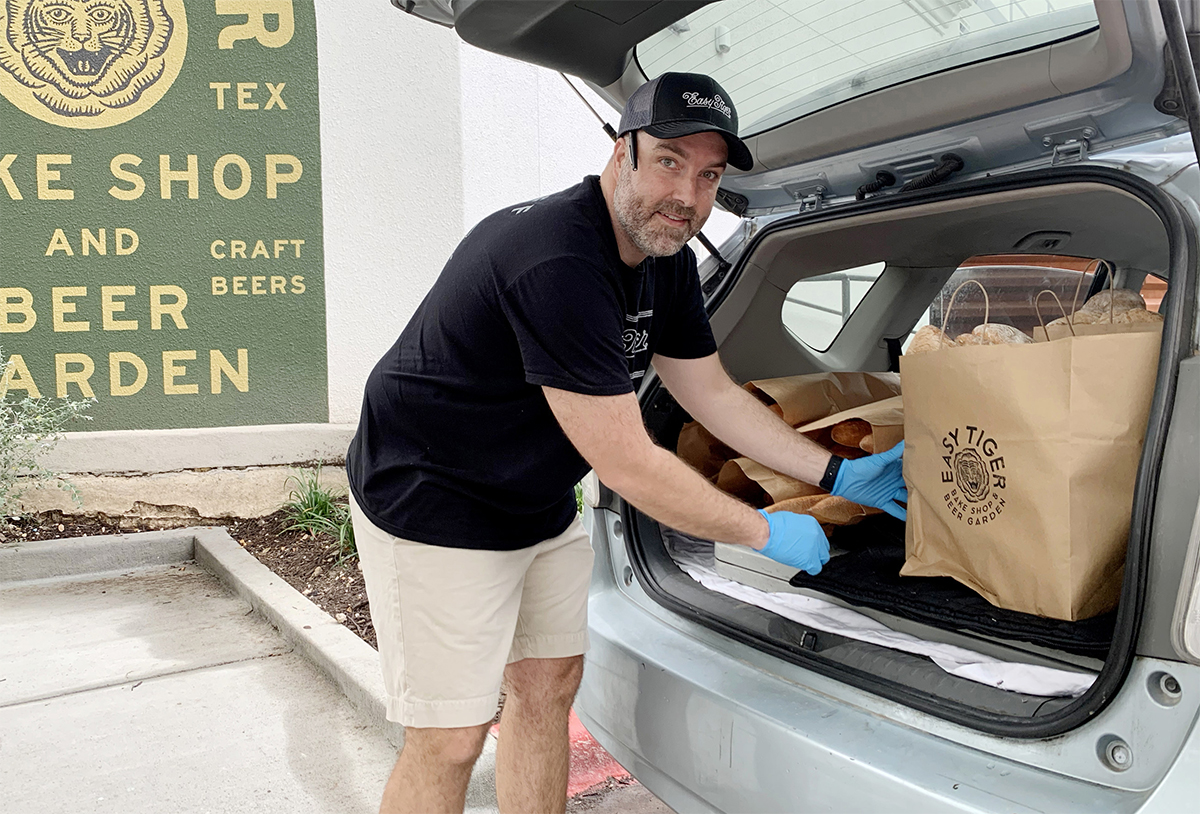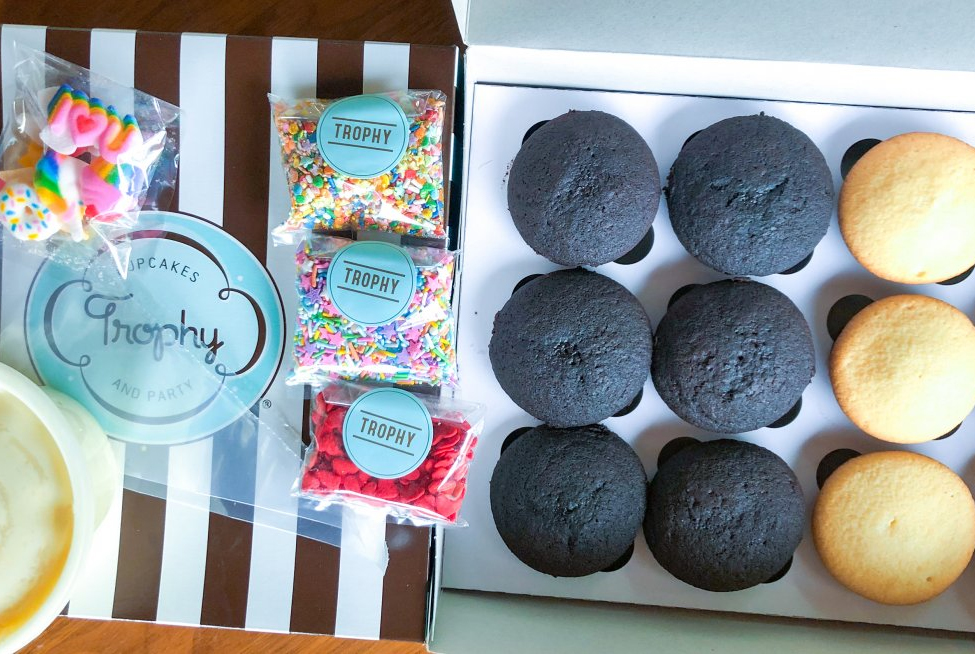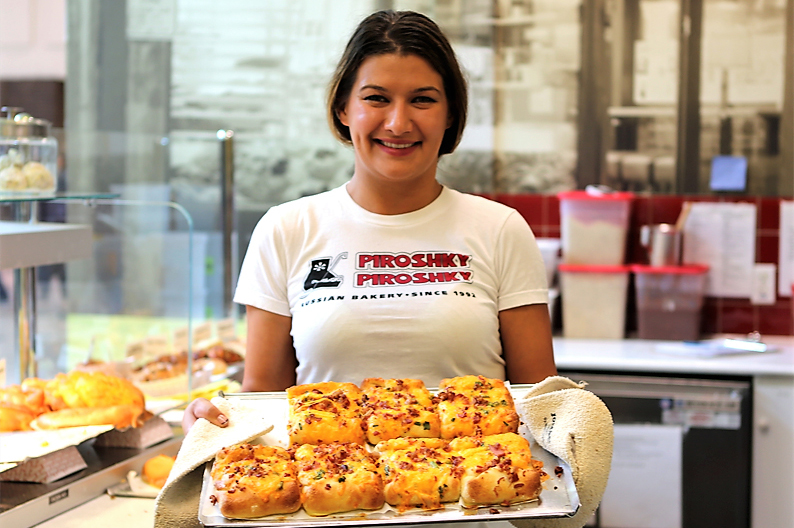Life is strange in May 2020. As I’m typing this sentence, I’m sitting in my apartment, fresh off a cinnamon roll... or two (Were they for breakfast or lunch? I can’t remember), as each day bleeds over into the next. The coronavirus has forced us indoors and off the street. This has affected our entire society, but especially business owners. As bakeries navigate this new and challenging world, they’re looking for ways to make rent, pay employees and more generally just stay in business.
But there’s reason to be optimistic. Bakeries around the country are finding creative and inspiring ways to bring in customers and also make their communities better. They’ve adapted their business models to focus on delivery and carryout. They’ve helped to raise money for local organizations that are feeding the less fortunate, while also managing to keep their lights on.
These days, you hear plenty of talk about us coming together to persevere in the face of adversity. That is exactly what the baking community is doing, in a variety of ways.
Giving back to communities
Our nation’s healthcare workers are true superheroes, taking care of those vulnerable and suffering while risking their own health and well-being. To show appreciation for their extreme efforts, bakeries are providing meals to these essential Americans.
At Bloom Baking Company in Kansas City, Mo., the Feed the Frontline program has been a way to keep churning out meals while helping the community give thanks to its nurses, doctors and other healthcare workers. Owner Sarah Darby is a former nurse herself, having left the profession ten years ago to run her own bakery. As the coronavirus outbreak affected the Kansas City community, Darby decided to use her business to help those exposed on the front lines.
Bloom Baking Company’s Feed the Frontline program allows customers to help feed those battling this virus. Supporters can choose to provide meals to a nurse, to a unit or department staff or to the whole building. They can add a special message and the bakery’s staff will prepare, pack and deliver the donated meal along with words of thanks and encouragement.
The community has responded with incredible support. With this program, Darby says she is able to keep her employees working. The bakery makes hundreds of meals in a week for the Feed the Frontline program, and they have delivered to places like Darby’s former employer Truman Medical Center in Kansas City.
To give its customers a special stay-at-home treat and to help out the first responders who help them, Ackroyd’s Scottish Bakery in Redford, Mich., launched its “Stay at Family Home Pack.” The pack includes four chicken pot pies, four macaroni and cheese pies and 12 Scottish shortbread cookies.
For each pack purchased, $5 goes to support an organization serving first responders. Among the organizations supported so far include the Pleasant Ridge Foundation and Rescue Detroit Restaurants + Feed Healthcare Heroes.
“We are incredibly grateful to be able to ship our food all over the United States. We also recognize that without our local first responders keeping us safe and putting their lives on the line every day, we may not have the opportunity to serve you,” the bakery says.

Many communities have been ravaged by this virus. Food banks have been struggling to keep up with demand for those in need of meals. Bakeries have stepped up to help them.
An additional 17.1 million people could face hunger in the next six months as a result of the coronavirus pandemic, according to Feeding America. Answering the call to help these people, Panera Bread launched the #SeeAPlateFillAPlate Challenge to inspire Americans to donate and fill a plate for someone in need.
The challenge raises funds for Together Without Hunger - a campaign in partnership with Feeding America to help provide freshly prepared meals to children and families facing hunger during the coronavirus pandemic.
Panera is encouraging those who can to join in and give at TogetherWithoutHunger.org, where a $3 donation will help put a freshly prepared meal on the table for a person in need. After donating, people are encouraged to spread the word by taking part in the #SeeAPlateFillAPlate Challenge on Instagram by decorating an empty plate, sharing a selfie with their creation on Instagram and tagging five friends to join the movement.
“We are all facing this unprecedented crisis together, and many are struggling to put food on the table,” says Niren Chaudhary, chief executive officer of Panera. “We have a unique opportunity to come together—to be a catalyst for good through our See a Plate, Fill a Plate movement – together, we can help combat food insecurity in our communities and make good food accessible to all.”
Despite experiencing a steep drop in sales related to the pandemic, Crema Bakery & Café in Austin, Texas, is fighting hunger with lunches for those in need.
“We thought there will be a lot of kids and a lot of families who don’t have access to food this week, so let’s put some free lunches out on social media,” says Crema Bakery & Café owner Jessica Tomberlin. “So whoever wants a free lunch can have one.”
The program has already given out well over one thousand lunches. In each bag is a sandwich, a juice box, fruit, chips and a sweet treat.
“It’s a tangible way that we can reach out to the community and show them that people care for them in a time when they feel nobody does,” Tomberlin says. “I just feel like if we’re there for people in the good times, it’s our responsibility to be there for them in the bad times too.”
Crema Bakery & Café continues to give away lunches during this time, asking for donations from the community and elsewhere to help pay for the meals.
Another Austin bakery, Easy Tiger, baked and delivered 10,000 fresh loaves of bread to the Central Texas Food Bank, Keep Austin Fed, Drive A Senior and Mobile Loaves & Fishes in the city. All four organizations experienced a dramatic increase in need due to the coronavirus and related employment and school shut-downs.
The bakery covered all labor and fixed costs to bake and deliver each loaf, and asked for community support to help pay for flour and other essential ingredients to make the bread.
“We are grateful to be part of this community and hope we can generously support Central Texas Food Bank, Keep Austin Fed, Drive A Senior and Mobile Loaves & Fishes, organizations that are working overtime right now to feed impacted families and the homeless in our community,” says Mike Stitt, chief executive officer of Easy Tiger.
Deliveries, at-home kits become valuable options
Reaching customers has been difficult for bakeries in the age of stay-at-home orders and social distancing. While businesses are starting to open back up again, their means of revenue have changed drastically in recent months.
Delivery and curbside pickup have become the norm for bakeries that remained open during the pandemic. Offering these options to customers within a certain distance keeps sales coming in, especially for bakeries that advertise this option on their websites and social media platforms.
It hasn’t taken much motivation for consumer interest in food delivery and curbside pickup to rise as in-person dining was all but eliminated during the first two months of social distancing, but that has been aided by efforts such as The Great American Takeout.
Launched in March, the nationwide campaign to boost the sales of the foodservice industry encouraged customers to patronize their favorite establishments on Tuesdays in order to help out these businesses during the tough economic period. Using the hashtag #GreatAmericanTakeout on social media, a growing number of restaurants and foodservice establishments promoted the special day to people all over the country.
The organizers of the nationwide event kept things fresh each week by using different themes and promotions. For instance, the third Tuesday of the campaign offered Americans the opportunity to win free takeout for a year. As part of its Shift4 Cares initiative created to put $200 million back into local communities, Shift4 Payments gave one winner $5,000 to be used at their favorite restaurants.
Customers could enter to win by posting a picture of their takeout or delivery meal on Instagram or Twitter during The Great American Takeout on Tuesday, April 7, along with the hashtags #TheGreatAmericanTakeout and #Shift4Sweepstakes, and tagging @TheGATakeout (on Twitter) or @thegreatamericantakeout (on Instagram).

Do-it-yourself kits also became a huge hit with customers during the initial months of social distancing, while helping bakeries bolster their sales in a unique way. Americans everywhere have been baking up a storm while stuck inside. Bread, in particular, has been a popular option for those looking to be creative.
San Francisco’s Mr. Holmes Bakehouse is selling bread starter kits for aspiring home bakers. As the bakery puts it, “A bread starter is the gift that keeps on giving.” That’s because a single starter allows bakers to make thousands of loaves of bread without the need for perishable goods or yeast. Mr. Holmes Bakehouse is offering the starter and a recipe for $15 or a starter, recipe and bread kit for $25. They are available for delivery.
For those looking for something simpler for themselves or their children, bakeries have offered do-it-yourself kits for many different products.
One bakery making good use of this idea is Collegeville Italian Bakery in Collegeville, Penn. The bakery and pizzeria introduced pizza kits for customers to enjoy at home. The kit includes a fresh dough ball, two containers of cheese, flour to use on the countertop with the dough, a container of cornmeal (optional), a topping such as pepperoni and a container of sauce.
A bakery that took advantage of this idea early on during the pandemic was Seattle’s Trophy Cupcakes. The bakery launched a Decorate Your Own Cupcake kit in mid-March. For $50 a dozen, customers receive 6 unfrosted chocolate and 6 unfrosted vanilla cupcakes, a tub of Madagascar vanilla buttercream (enough to decorate all 12 cupcakes), 3 small disposable pastry bags, 3 bags of sprinkles, and 12 sugar toppers.
“We hope that this will be a fun activity for the kids that will spark their creativity and keep them busy for hours! The bonus? The whole family gets to enjoy yummy cupcakes for dessert!” the bakery says.
Katiebug’s Sips & Sweets in Oklahoma City, Okla., offered families a delicious game night kit. It included edible Jenga towers, jelly bean roulette, puzzle cookies, pool cake balls, Twister cookie dunkers, dice Rice Krispie treats, domino brownies, scramble cupcakes and snack mix.
Getting creative in tough times
What are you to do when you’re looking at more down time but still want to reach customers? To help all of the bakers (both professional and home) quarantined, Christina Tosi launched a free Instagram baking club. The founder of Milk Bar shared baking tips every day at 2 p.m. EST on her Instagram stories.
Among the ways in which Tosi helped her fellow bakers were riffs on some of her most popular products like the Compost Cookie and Cereal Milk, the recipes of which can be found on her personal website. The series was a source of comfort for Tosi and for her many followers during a challenging time.
“I’m uncertain of the future, and yet certain about the need to bake,” Tosi said in one of her Instagram posts. “That is where I find myself. That is where you can find us.”
Other bakers have been getting creative in getting food to customers. The recently-opened Bernal Bakery, established after owners Ryan Stagg and Daniella Banchero lost their jobs as chefs due to the pandemic, found a way to do contactless carryout during the coronavirus pandemic.

Instead of bringing customers their orders directly, the San Francisco bakery lowers its baked goods to customers with a basket and rope. To get baked goods, customers push a wireless doorbell and after their order is confirmed, the basket is lowered containing their order.
Seattle’s Piroshky Piroshky used its creativity to attract customers during the slowdown by teaming up with another business, Pike Place Chowder, to do home delivery. At its website, customers could order a family deal that includes a 32-ounce chowder of their choice and four Piroshkies and Piroshky bread rolls for $49.95.
Piroshky Piroshky also began livestreaming from its bakery. On its website, visitors could see what the bakers were making and feel like they were part of the process. It was an attempt to connect them, so that more people would want to support Piroshky Piroshky and the other businesses at Pike Place Market.
It worked, as owner Olga Sagan says that its customers were very generous in response. “Our tips are going up. I hear our tips are going up three to four times,” she said in March.
That communal feeling the bakery brought to customers was extended to other local businesses. Piroshky Piroshky launched Catch22Delivery, a free “Hospitality Hub” to connect Seattle small businesses to their customers. The platform allows visitors to find foodservice establishments in the area to give them their business.
Catch22Delivery gives customers greater ease in finding a restaurant that delivers, with all of their money going to their favorite places. It facilitates direct communication with the restaurant, with possible partial or full avoidance of third party fees.
Immediately after launching the service, Sagan was already getting requests from around the country to develop the platform for other small businesses to connect with their customers.





